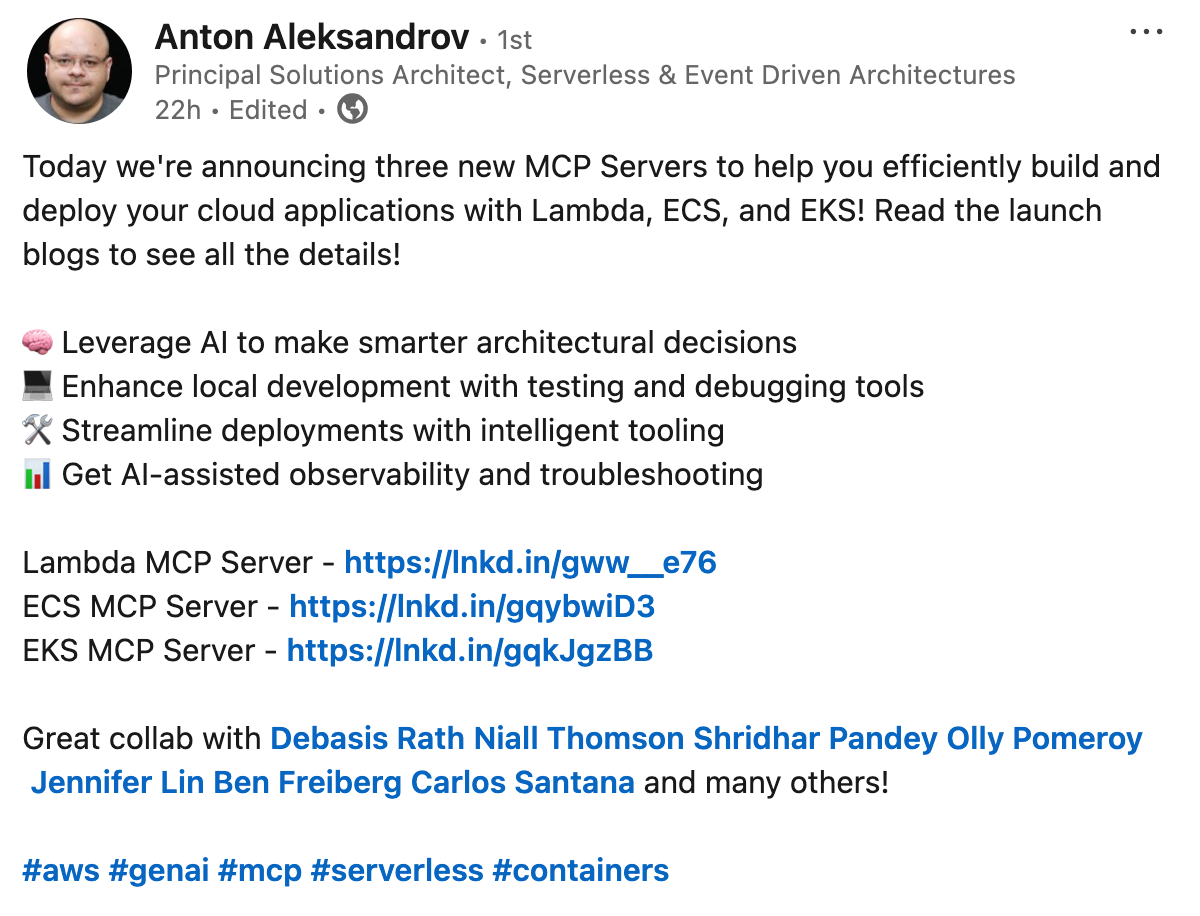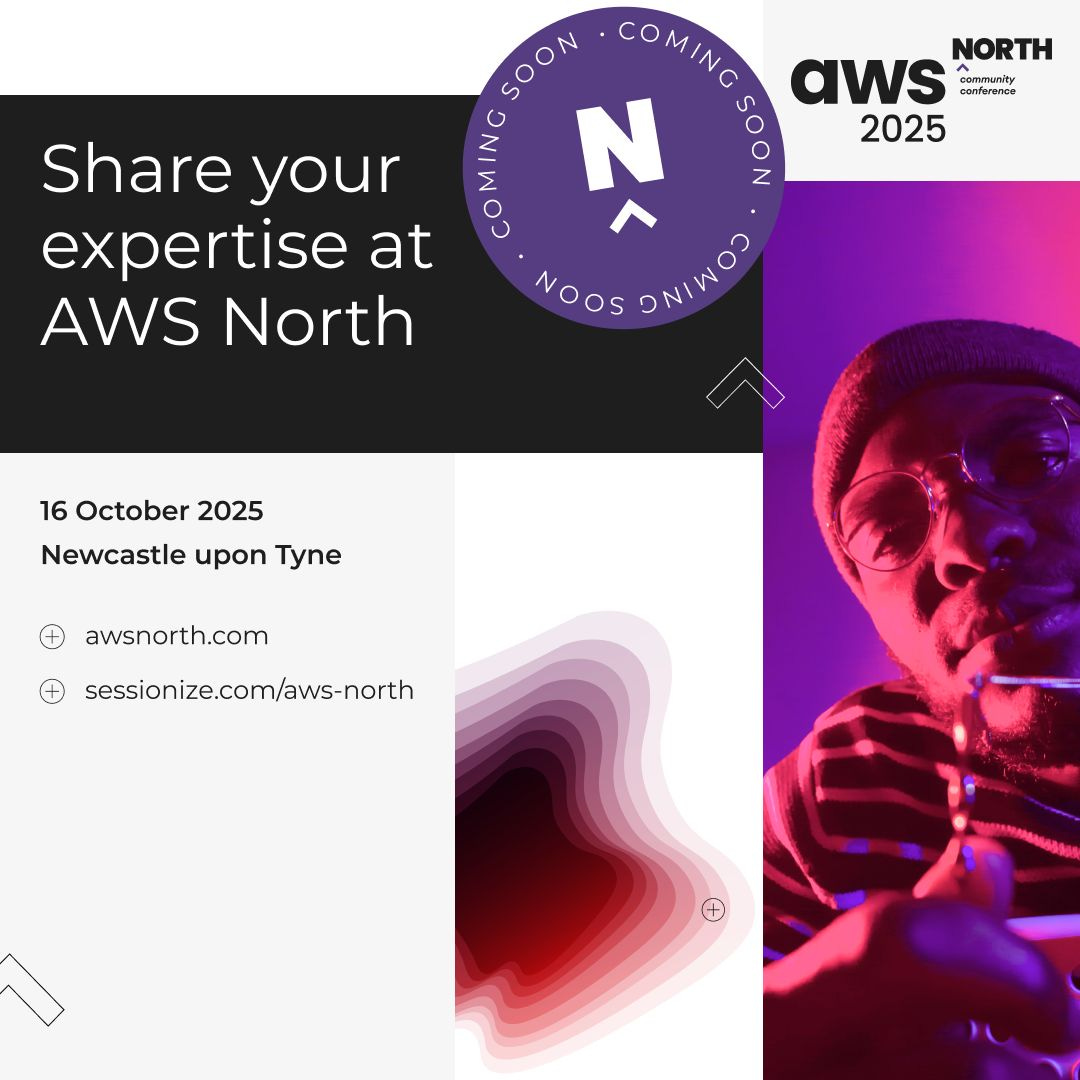#39 An Exciting Time For Serverless Databases! ⚡
This week, our expert is AWS Serverless Hero Ant Stanley, our spotlight falls on Cloud Dialogues Co-Host Georgia Smith, we look at the latest service releases, news, articles, & more!
Welcome
In last week’s issue, our serverless expert was AWS Senior Specialist Solution Architect Mark Sailes, and our spotlight fell on AWS Community Builder Victoria Demina!
This week, our serverless expert is AWS Serverless Hero Ant Stanley, our spotlight falls on Cloud Dialogues Co-Host Georgia Smith, we look at the latest AWS service releases, blog posts, hints and tips, news and more!
This week’s newsletter is sponsored by Leighton.
A Glimpse into My Week 🎤
This week, I published two separate articles using Amazon Bedrock and AI. The first was titled: “Amazon Bedrock AI Image Manipulation with Amazon Nova“ where I showcased image ‘inpainting’, generation, ‘outpainting’, background removal and more!
The second was titled “Validating AI-generated images using AI and Amazon Bedrock“, and covered gaining confidence in AI-generated images using a validation framework underpinned by Amazon Bedrock:
As always, please check them out and feel free to let me know what you think of them!
📰 Articles that caught the eye
Here are some stand-out articles I read during the week in the World of Serverless, AI, Engineering and Architecture!
⭐ My favourite this week was the article by Vlad Khononov.
Armand Rego wrote a great article on “Using FFmpeg in AWS Lambda with Docker“.
Seth Orell covers “How to Crater Your Database, Part Four - Consistency“.
Davide De Sio discusses “Deploy your first AI agent with Strands Agents SDK“.
Ran Isenberg has a fab article called “Agentic AI & MCP for Platform Teams: Strategy and Real-World Patterns“.
Vlad Khononov discusses “With AI, everything is so complicated... and this is great news!“.
Pravesh Sudha covers “Simple Steps to Deploy a Three-Tier E-Commerce System on AWS EKS“.
Dennis Traub wrote a great article called “Building AI Agents with Strands: Part 1 - Creating Your First Agent“.
Lalit Kale has an interesting article entitled “Modeling Shared Entities Across Bounded Contexts in Domain-Driven Design“.
🎓 Ask the Expert
Each week, I ask a different serverless expert the same three questions to get their personal insights - this week, we have AWS Serverless Hero Ant Stanley:
Opinions are the author’s and do not express the views of their employer.
1. What is one common mistake you see teams making when implementing serverless solutions, and how can they avoid it?
2 areas, but sort of the same answer. Unnecessary complication.
Overcomplicating infrastructure as code. I recommend keeping IaC as dumb as possible, which makes it easier to develop and debug. I see a lot of teams building custom components (whether its CDK, Pulumi, Terraform, etc) that end up being single-use, and they generally over-modularise their IaC. One big file with your entire stack definition is often easier to work with, particularly with CDK and Pulumi. Just use search to find the code you need. No passing dependencies between modules/components.
A second common mistake is being too event-driven too early. Not everything needs to be event-driven, and when an event-driven workflow is required, I often see it over-engineered. Look to simplify event-driven systems as much as possible, and reduce the steps. Event-driven systems can be hard to debug and monitor. Only using it where it’s necessary and keeping it as simple as possible, makes them a lot more maintainable.
2. Which serverless tool or service are you most excited about right now, and why?
For me, it's Iceberg Tables in combination with DuckDB. They enable true serverless data analytics platforms. AWS's recent release of S3 Tables and DuckDB's support for it make this stack a lot easier to work with now. Decoupling storage from the query engine is not new, but it has taken a big leap in the last year. Running DuckDB as a query engine in Lambda / (choose your FaaS), connecting to an Iceberg Table in an S3 Table unlocks huge flexibility without performance compromises. It’s also an open source stack, as you can easily replace the AWS-backed stack with other providers (ie Motherduck, Datastax, etc)..
3. What is your favourite trick or tip when working with serverless that the readers may find interesting?
Two areas.
System-wide schema definition. Try to define, as much as possible, the schema your system uses. Define a schema for what will be presented (ie via an API) using either a GraphQL or OpenAPI spec. Then also define a schema for what will be persisted, using your language of choice's type system, and an ORM or abstraction over the datastore (I use DynamoDB Toolbox a lot for this). Also, understanding how you store your data and how you present it in most cases is very different.
End-to-end testing, I find really valuable. I spend the time to get a decent e2e test harness setup early on, and focus all my testing on e2e. Once it is up, I just write simple e2e tests for each of my features, and very rarely write unit or integration tests. I find the upfront work to get e2e working pays off long term. I'll write unit tests where I have a discrete piece of critical business logic that I've encapsulated into its own module, but that’s about it for unit tests. In a serverless world, I find the gap between e2e tests and integration tests not to be that large, so I just focus on e2e.
The side effect I've found of doing both of these things has made development using an AI assistant a lot easier.
✅ Bonus tip: join the hashtag#believeinsls discord! There is a community there to answer any questions you may have without getting overzealous on serverless or without judgment! Check it out!
🚀 New Releases
Here are the latest and most interesting releases this week in the AWS World:
⭐ This week, my favourite release is DQSL going GA! This is seriously a game changer! Also, Serverless MCP Server for Lambda, ECS and EKS!
Amazon EKS and Amazon EKS Distro now support Kubernetes version 1.33.
Mountpoint for Amazon S3 now lets you automatically mount your S3 buckets using fstab.
Announcing new Model Context Protocol (MCP) Servers for AWS Serverless and Containers.
Enhance AI-assisted development with Amazon ECS, Amazon EKS and AWS Serverless MCP server.
Amazon CloudWatch Synthetics Adds Java Runtime for Lightweight API Monitoring.
Amazon Aurora DSQL, the fastest serverless distributed SQL database, is now generally available.
🔥 Tip: Check out https://aws-news.com/ for the very latest up-to-date serverless releases as they happen, created by the talented AWS Serverless Hero Luc van Donkersgoed.
👷🏻 Tools & Frameworks
Check out the latest open-source frameworks, news, and tool updates from the past week.
EventCatalog v.4.2.1 - A new version of the AsyncAPI integration with EventCatalog is now out.
AWS CDK - cdk drift is introduced, which is a new CLI command that checks your stacks for drift between your local CDK app and the actual deployed resources, then presents a clear, readable diff of what’s changed.
AWS CDK - Build Custom CLI's, Deployment Automation, and more with the AWS CDK Toolkit Library.
💡 DynamoDB Tip of the Week
Each week we have a quick DynamoDB tip from our resident DynamoDB expert, Uriel Bitton.
💡 “Use on-demand when you can’t anticipate your traffic, provisioned when you can, and switch between modes as you learn patterns”
Start with on-demand mode if your traffic is unpredictable to avoid throttling. As your traffic stabilises, switch to provisioned mode for better cost control and performance tuning.
Further reading: https://docs.aws.amazon.com/wellarchitected/latest/serverless-applications-lens/capacity.html
✖️ Social of the Week
This week’s social is on LinkedIn by Anton Aleksandrov:
I love this post, and it is exciting to see AWS embrace MCP across a number of compute services. It’s exciting to see this new technology start to play out with regard to patterns and services! I’m keeping a close eye on this space!
What are your thoughts on MCP and these new releases?
🎙️ YouTube & Podcasts
Here are some of my favourite videos and podcasts this week.
⭐ My favourite video this week is by Mike Chambers on “What is MCP?“
Aaron Walker covers “Build Break Repeat - Introducing Strands Agent“.
Mike Chambers asks the question “What is MCP? No, Really!“.
Steph Gooch saves us money with “Give me 15 Minutes & I’ll Save You Money on Your AWS Bill“.
Tim Berglund discusses “Why MCP really is a big deal“.
Gene Kim on “Vibe Coding”.
James Lewis covers “The Magic of Small Things - 10 Years of Microservices“ in his GOTO 2024 video which was just published.
The Primeagen discusses “Its Finally Over For Devs (again, fr fr ong)“.
Weekly Case Study 🔍
This week’s case study comes from Maya’s API management with Amazon API Gateway:

Maya, the Philippines’ leading fintech company and digital bank, faced challenges managing a growing number of APIs across multiple teams, leading to fragmented infrastructure and inconsistent standards.
This solution allowed Maya's development teams to focus on feature development while offloading operational concerns, resulting in improved scalability, reliability, and developer productivity. Go check out the article for full details.
🗣️ Inspirational Quotes and Thoughts
This week’s inspirational quote (Linus Law) comes from American open-source enthusiast, Eric S. Raymond:
“Given enough eyeballs, all bugs are shallow.”
- Eric S. Raymond
This law highlights the value of open source and peer review where crowd-sourced quality assurance makes software more reliable. A more formal statement is: "Given a large enough beta-tester and co-developer base, almost every problem will be characterised quickly and the fix obvious to someone."
As a quick trivia fact, Eric named the law in honour of Linus Torvalds!
What are your thoughts and experiences with this law? Feel free to leave a comment below.
🗳️ Poll of the Week
In last week’s poll, we asked the question “Do you worry about your future role with the enhancements in AI?”.
Interestingly, 60% said yes, 20% said no, and 20% said other. It’s an interesting one, as the AI hype-cycle is real on most social media platforms now, and it is easy to get caught up either way. My own thoughts:
”I don’t know if AI will replace most white-collar jobs in the next five years or not.
What I do know though, is that I’ll keep learning, adapting, and up-skilling to stay relevant regardless, just as I have always done.
Focus on what you can control 🌱”- Lee Gilmore
This week, we ask the question, “Do you work multi-cloud in your day to day role?”. Feel free to leave a comment below on why you chose your answer and your experiences!
📅 Serverless Events
The following serverless events are upcoming, so mark your calendars.
🎟️ To note, CFP is currently open for the AWS North Community Conference, which I am helping organise, and we also have opportunities for lightning talks throughout the day. Go check it out!
Other fantastic events happening soon:
ACD Midwest - 5th June 2025
ACD Australia - 15th August 2025
ACD Adria - 5th Sept 2025
AWS Community Day Baltic - 10th Sept 2025
ACD Aotearoa - 18th Sept 2025
ACD Poland - 18th Sept 2025
ACD Portugal - 27th Sept 2025
ACD DACH - 7th Oct 2025
AWS North Community Conference - 16th Oct 2025
Do you have any upcoming events that you want to highlight? Message me below!
⭐ Spotlight
This week’s spotlight falls on Cloud Dialogues Co-Host Georgia Smith who runs the show alongside AWS Community Builder Matt Gillard!
Georgia is a co-host of the great Cloud Dialogues Podcast, ex-AWS, and also a transformation leader with 14+ years of experience across operations and consulting, working with C-suite leaders to design and launch innovative digital products and strategies using AI and cloud technology. Go check out the latest issue of the podcast below:
Thank you for all you do for our wonderful community!
Thank you for reading the latest Serverless Advocate Newsletter!
If you want to find out a little more about me, please have a look at:
https://www.serverlessadvocate.com/
See you next time,
Lee













